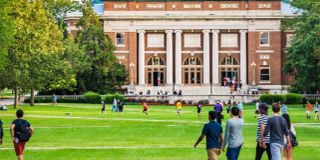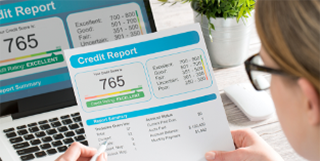Private Student Loans
When preparing for college, one of the first things most students do is fill out a Free Application for Federal Student Aid (FAFSA) with the U.S. Department of Education. This gives you access to financial aid, including grants (essentially free money for college), federal work-study, and federal student loan programs.
As a general rule, federal student loans are better than private student loans when it comes to financing the portion of your college education not covered by grants, scholarships, or savings.
This is because federal student loans are backed by the federal government, have some of the most minimal eligibility requirements, and offer some of the best rates and repayment plan options. In addition, federal student loans generally do not require a co-signer.
That said, there are limits to how much you can borrow in federal student loans. If you reach that limit and still need funding to cover the cost of education, private student loans can help you out. This page aims to provide you with everything you need to know about private student loans.
| Lender | Range of APRs |
Repayment Lengths |
Minimum Credit Score | |
|---|---|---|---|---|
|
|
||||
What You Need to Know About Student Loans
Here, we break down everything you need to know about student loan refinancing, including how to do your research and find the right loan, the application process and what it takes to get approved, and how to repay the new loan.
Research
The first part of the process is doing your research as a potential borrower. Look up different lenders and see how they compare. Keep in mind that federal student loans should (usually) be your first loan option. Private student loans should cover the gap between college costs and your federal loans and financial aid.
The following are some things to look up for each lender you’re considering:
- How the “cost of borrowing” or interest rates compare
- Whether variable- or fixed-rate loans are available
- What the loan minimums and loan limits are
- If there are any origination fees
- How the lender determines creditworthiness
- Repayment plan options and whether repayment of student loan debt is required while in school or if it can be deferred
- If the lender has specific offerings geared toward the specific loan type you’re looking for (graduate student loans, undergraduate loans, etc.)
- If the lender offers any borrower benefits, like a one-time graduation credit or a credit in exchange for excellent grades.
Make a list of your top choices and carefully weigh the differences. Note that some lenders will allow you to prequalify with a soft credit check and let you know what rates you can get, but it’s important to remember, that the better your credit, the better the interest rates. Some lenders might require a minimum credit score or income to even apply. This can help you decide between your final choices.
Apply
Before you apply for a private student loan, you should:
Complete the FAFSA
This can be done as soon as you’re accepted to a college. Ideally, it should be completed well before the first tuition payment is due, as it can take up to 10 days to get the results.
Accept all federal student aid
Because federal grants are essentially “free money” and federal student loans tend to have the best rates and terms, your next step after getting the FAFSA results should be to accept all federal aid. Upon reaching the aggregate loan limit, you can turn to a private student loan lender, borrowing as little money as possible.
Look into PLUS loans and parent loans
Parents of undergraduate students or graduate students may apply for PLUS loans and parent loans from the federal government for additional help paying for college. These are also often better than private student loans.
Do your research and find the right private lender
Note that many private lenders respond quickly to loan applications, but it’s a good idea to complete the process at least a few weeks before funds are needed.
As you prepare your loan application, it’s a good idea to find a creditworthy cosigner. You’re more likely to qualify for better rates with a cosigner. In fact, very few student borrowers are approved for a private student loan without a cosigner. You should also note any residency requirements for the loan, such as needing to be a U.S. citizen or permanent resident.
While loan applications vary, you will typically be required to provide your personal information, allow a credit check to be performed, and verify that you’re attending an eligible school. You can often complete these applications online.
Sign
Once you’re approved for a loan, you have to sign to accept it. When signing, you agree to all terms and conditions of the loan. The lender will then connect with your school to have the financial aid office certify that the amount you have been approved for, together with other financial aid, will not exceed the total cost of attendance of your school. The lender will then disburse directly to the school you’re attending. The law requires that lenders provide a three business day “right of rescission,” during which you can cancel the loan without obligation. After that point, the obligation is official. You (and your cosigner) will be responsible for the loan.
If the loan covers more than what you owe the school directly, you may be refunded the difference from the school. Keep in mind that this is borrowed money and should only be kept if needed to cover other costs associated with attending college (for example, off campus housing or travel expenses). Otherwise, you may want to repay the amount immediately to avoid additional interest fees in the future.
Repay
Many student loans allow for deferment while you’re in school and for a short grace period after you leave or your enrollment drops below half-time. This means you aren’t required to make payments during that time.
However, except for subsidized federal student loans, student loans still accumulate interest while in deferment. This means that, even if it isn’t required, it might be a good idea to make payments on any loans while in school to avoid compound interest after graduation.
After the loan grace period ends, the loan amount must now be repaid in monthly payments to avoid late fees. You should consult with your loan servicer about what repayment plans are available and sign up for autopay.
Note that while in repayment, you may be able to refinance for better loan terms or more flexible repayment options. Refinancing options can also include taking out a federal consolidation loan to roll all of your federal loan payments into one new federal loan. Private student loans are not eligible for federal student loan consolidation but can be refinanced by private lenders if you qualify. For recent or soon-to-be grads, some private student loans offer “cosigner release” after making a sufficient number of on-time payments and passing a credit and income test, potentially freeing your cosigner from any obligation to the rest of the loan balance.
Individual Student Loan Lender Fact Sheet
As mentioned, it’s important to do your research. CollegeFinance.com aims to make that easier for borrowers in repayment by doing the legwork for you. Below are individual fact sheets for each provider.
|
|
Refinancing Student Loan FAQs
Check below for answers if you still have questions about refinancing your student loans.
Most private student loans do require a cosigner, especially for undergraduate students. However, some lenders like Ascent or Earnest offer options for qualified borrowers to apply without one. These are typically available to borrowers with strong credit or steady income.
Refinance Your Student Loans Today
If you’re ready to refinance your student loans, let CollegeFinance.com help you with the research and provide you with everything you need to know about paying off student debt. Click the links in the lender fact sheet to learn more about each refinance option.
View Loan Options









